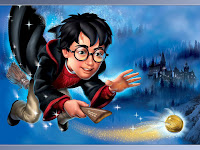 Now that Harry Potter mania has died down (presumably because everyone has finished the last book and seen the latest movie), and I am on page 350 of the 600-odd pages of the penultimate book (I’m always behind in most areas of my life), perhaps now I can comment on the insanity.
Now that Harry Potter mania has died down (presumably because everyone has finished the last book and seen the latest movie), and I am on page 350 of the 600-odd pages of the penultimate book (I’m always behind in most areas of my life), perhaps now I can comment on the insanity.Why is it that everyone goes so crazy over Harry Potter? Why are there midnight release times, pre-order options on a myriad of websites and newsworthy reports of security breaches of the manuscript?
J.K. Rowling, who conceived of Harry Potter on a train ride between Manchester and London, combines a set of factors that have worked together to make the series as popular as it is.
Escapism, Pure & Simple
The first book in the series, Harry Potter and the Philosopher’s Stone, was published in 1997, so I can’t link its creation to any post 9/11 desire for escapism. But there was certainly the interim after the first invasion of Iraq and some gruesome stuff going on in Kosovo. But regardless of world politics, the Harry Potter series provided a magical other-world full of spells, fantastical creatures and mysterious secrets. As any good book should take you into another reality, Harry Potter’s world of wizards and witches took readers into an entirely different realm of magic with its characters and curiosities. A realm that although it functioned differently from ours, still maintained…
Relatable Characters & Experiences
I’m seeing this more and more as the series progresses. Especially in Harry Potter and the Half-Blood Prince, which I’m reading now. Although Harry is imbued with exceptional powers (even when measured against those in the wizarding world), he still falls victim to such teenage afflictions as jealously, most notably when he catches Ginny Weasley kissing Dean in the corridor and we read Harry’s internal monologue, mulling over whether or not it is brotherly love, or something else, that makes him want to smash poor Dean in the face. The love played out as anger and bitterness between Hermione and Ron is another example of real-life situations that readers can relate to. And the character Luna is a wonderful sketch of those awkward, slightly-removed-from-reality-type kids we had in our classes growing up – and how lovely is Harry’s empathy and acceptance of her.
Wicked Wordsmithery
This is one of J.K. Rowling’s greatest talents: making up new words and interesting names: Dumbledore evokes quiet power and sagacity. Voldemort sounds like menacing thunder booming. Harry’s Herbology class is filled with such onomatopoeic plants as Snargaluff (requiring protective gloves to handle), Whomping Willows (requiring speed, agility and perhaps a helmut to avoid injury) and Bubotubers (decidedly less dangerous than the previous flora, but its pus can still cause painful boils, nonetheless). Some other fabulous locutional concoctions: Ambrosius Flume (a businessman), Budleigh Babberton (a charming village), Barnabas Cuffe (editor of The Daily Prophet), Mundungus Fletcher (a shady member of the Order of the Phoenix) and St. Mungo's Hospital for Magical Maladies and Injuries (self-explanatory, no?).
Classic Narrative Devices
And of course, as many critics have pointed out, J.K. Rowling employs all those plots and characters we’ve seen before: good vs. evil and their inherent connection (hello Luke Skywalker and Darth Vader), orphans unraveling their pasts, the journey from boy to man, and political allegory. (I hear that there is more than a hint that the political climate in Deathly Hallows mirrors what was happening during World War II. And having just seen the most recent movie, the Ministry taking over Hogwarts and instituting curricular change and teacher evaluations rings true of educational reforms of the past.)
So there are several factors that contribute to the wild success of Rowling’s magical narratives. Put together, these provided a series of books that saw ridiculous security over the official release date of the latest publication (imagine suing people over the release of On Chesil Beach, an excerpt of which I’m sure I read prior to publication – isn’t it in keeping with protocol to release an excerpt?) and saw the book in people’s hands across this city and around the world during the last week of July. And all these factors will keep me going for the next 250 pages of The Half-Blood Prince. After that, I'll need a serious Potter break before attempting the final 700+ page installment that may toll the end of Potter Mania.
No comments:
Post a Comment